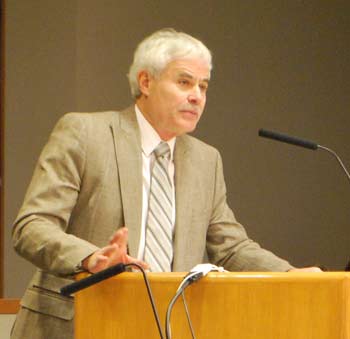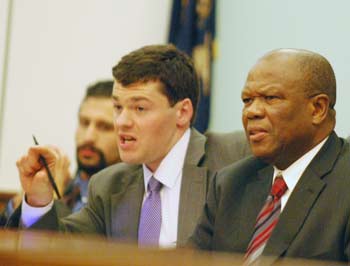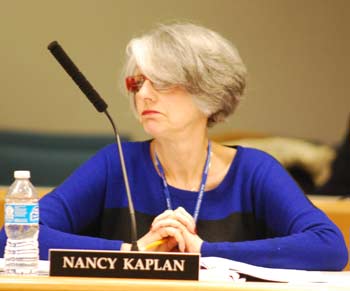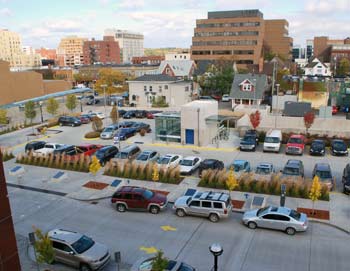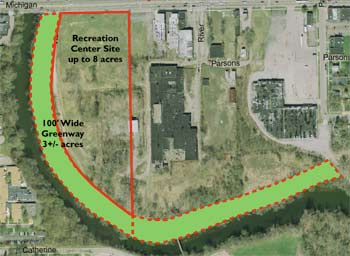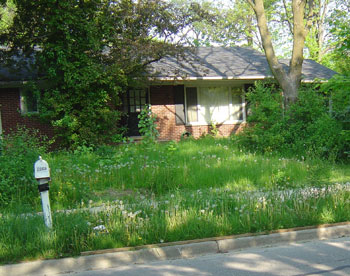Two recent meetings of the “urban core” communities near the city of Ann Arbor have provided some quiet momentum toward possible improved public transportation services in the Ann Arbor area. The effort’s regional focus is reflected in the location of the meetings, which have taken place outside Ann Arbor – at Pittsfield Township hall and Saline city hall.

AATA governance expansion options.
However, at the more recent meeting in Saline, which took place on April 25, 2013, Ypsilanti Township supervisor Brenda Stumbo stated her expectation that the city of Ann Arbor would provide the necessary leadership for better transportation. The meetings of elected officials, which have been coordinated by the Ann Arbor Transportation Authority, include representatives from the cities of Ann Arbor, Ypsilanti and Saline, the village of Dexter, as well as the townships of Pittsfield and Ypsilanti.
The effort to focus on improved transportation within a narrower geographic footprint near Ann Arbor – instead of the whole of Washtenaw County – has come after an attempt to establish a countywide transit authority unraveled in the fall of 2012. Of the communities in the more narrowly focused urban core, Ypsilanti has been the most assertive in pushing for action.
At the Ypsilanti city council’s April 23 meeting, councilmembers made a formal request to join the AATA under the transit authority’s existing enabling legislation – Act 55 of 1963. That request will now be considered by the AATA board. It also will require the cooperation of the Ann Arbor city council – to amend the AATA’s articles of incorporation.
For the city of Ypsilanti, joining the AATA represents a new way to generate more funding for transportation. Because the city already levies at the state constitutional limit of 20 mills, the city itself can’t add an additional tax burden. But the AATA could ask voters of all member jurisdictions to approve a levy of its own – something that it currently does not do. And that would not count against the 20-mill limit.
Ann Arbor city councilmembers who attended the April 25 urban core meeting expressed cautious support of the idea of adding Ypsilanti to the AATA. Stephen Kunselman (Ward 3) described himself as “tickled” to see the analysis and breakdown of governance and funding options in the meeting packet. Chuck Warpehoski (Ward 5) ventured that if the effort required a “coalition of the willing,” then he was willing. But he expressed some caution about the amount of additional tax money Ann Arbor voters might be willing to approve.
Ann Arbor mayor John Hieftje ventured that the Ann Arbor city council might be able to address the issue in June – after the fiscal year budget is approved in May. He suggested specifically an additional AATA board seat for Ypsilanti as well as one for Ann Arbor, which would bring the board to a total of nine. Hieftje indicated a possibility that the August deadline for placing a millage on the November ballot could be met. Sally Petersen (Ward 2) expressed her view that Ann Arbor voters would need a clearer idea of what the improvements would be, before they’d support an additional tax.
If a decision were not made until August to place a measure on the November ballot, that would result in a relatively aggressive timeline for a millage campaign. For the AATA’s part, board chair Charles Griffith reiterated at the April 25 meeting the same sentiments he’d expressed a week earlier at the board’s April 18, 2013 meeting – that the AATA would give Ypsilanti’s request full consideration. He also stressed that the AATA didn’t want to take an action that could preclude other approaches to governance.
Those other approaches to governance could include a range of possibilities, such as membership of additional jurisdictions in the AATA – like Pittsfield and Ypsilanti townships. But in terms of their readiness to see a millage put on the ballot, neither township seems as ready as the city of Ypsilanti.
Based on remarks made on April 25 by Stumbo and township clerk Karen Lovejoy Roe, Ypsilanti Township’s first priority is to get a fire and police services millage approved by voters – likely in August. After that, they’d turn their attention to transportation. At the earlier urban core meeting – which took place at Pittsfield Township hall on March 28 – Lovejoy Roe had expressed some enthusiasm for moving ahead more quickly with transportation in November. But recent minutes of the township board indicate a desire to keep November as a possibility for a re-ask, in case the fire and police services millage doesn’t pass in August.
For Pittsfield Township supervisor Mandy Grewal, it was the cost allocation in one of the proposed transit scenarios that appeared to give her some pause. On that scenario, the cost of services compared with the amount of revenue generated resulted in Pittsfield Township getting back $0.79 in services for every dollar that residents contributed – the least of any jurisdiction in the mix.
Saline mayor Brian Marl expressed solid support for some kind of expansion of services to include the city of Saline, but reserved comment on the details of any of the cost or governance proposals.
This report includes more details on the governance and cost proposals, as well as some of the commentary from elected officials at the April 25 urban core meeting. [Full Story]
